It’s remote, it’s out in the mountains, a family’s endeavour to give back to its ancestral village
By Raqib Hameed Naik, TwoCircles.net,
Breswana, Doda (Jammu and Kashmir): Located at an altitude above 7,100 feet, Breswana – about 200-odd kms from Jammu – is one of the many typical remote villages of the mountain region – no motorable roads, rocky, harsh terrain with steep slopes, not to mention the adverse weather for most time of the year.
In absence of a decent, complaint-free government school, children from the village hardly had any choice till 2009, when Haji Public School, a not-for-profit educational institution was started by the Haji family.
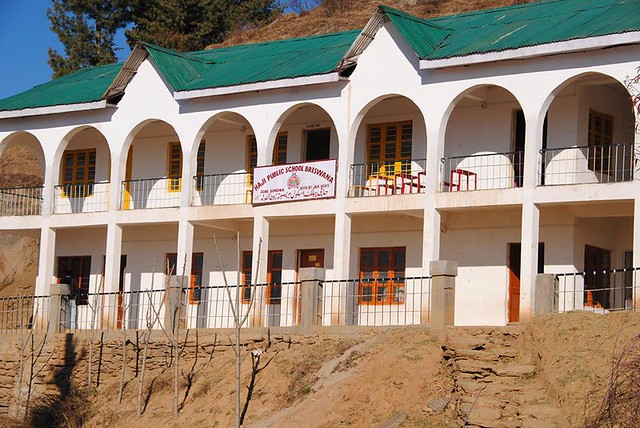
Haji Public School building
Encouraged and financed by a Singapore-based Indian businessman Nasir Haji as a pooling of the substantial Zakaat (obligatory Islamic charity), the school was established by and is managed by Nasir’s brother Saleem Haji and his daughter Sabbah Haji. Her mother Tasneem Haji, an educationist, too is part of the school set up. Nasir Haji had already set up the philanthropic Haji Amina Trust in Doda.
In her early thirties, Sabah Haji was born and raised in Dubai, where her father was a manager in a shipping company. In 1997, her family shifted to Bangalore, where Sabbah completed her schooling and earned a Bachelors in Commerce from Christ College, Bangalore. Professionally, she worked with various organisations in various capacities such as staff accountant, team lead, content writer and managing director before leaving the comfortable corporate job and returning to her ancestral village up in the mountains to become part of the Haji Public School.

Fresh group of volunteers on horses moving towards Haji Public School
“Nasir uncle takes care of the finances in terms of funding and donations. My father Saleem Haji is the sarpanch of our village and it was for his planning and support that we have been able to do so many things here,” says Sabbah, director of HPS.
The only one government school in the village had such poor quality of education that it was directly affecting children’s personality, confidence and future. “Therefore we decided to start from kindergarten with high standard of education as given to children’s in first world countries,” Sabbah informs.

Sabbah Haji
Over winters of 2008-2009, Hajis shortlisted two young men from the village and trained them to be the first teachers for the two kindergarten classes. The Haji Public School was inaugurated on May 4, 2009 with classes held in two room cottage as the main school building was under construction.
“No matter how poor, no matter how difficult their circumstances are, all that the villagers are now focused on is ensuring that their children are learning. Kids as young as three-year-olds walk over an hour every day in the mountains to reach our school,” Sabbah says about the enthusiasm among the villagers.
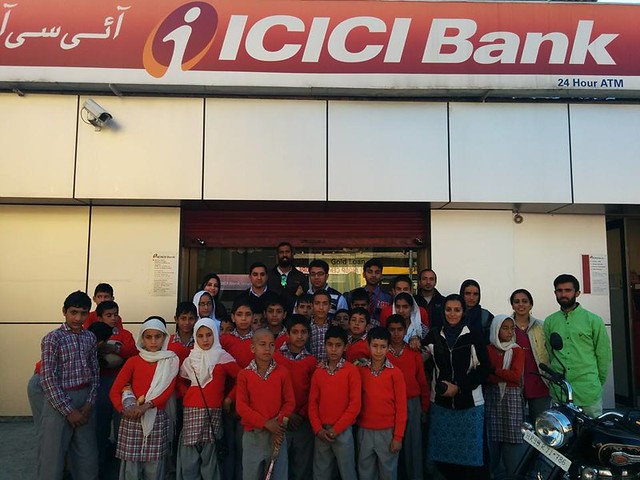
Students of Haji Public school on an educational trip to ICICI bank in Baderwah town to know about working of an ATM machine
The school motto is ‘Terras Irradient’ – Let Them Illuminate the Earth. And what better tool than education to illuminate the Earth and the lives of the lesser mortals!
When it started, the school had student strength of 30 with two grades. As of 2015, the student strength has risen to 300 plus studying in classes up to sixth grades. It has teaching staff of over 20, including full-time, local teachers as well as long term Indian and international teaching volunteers.
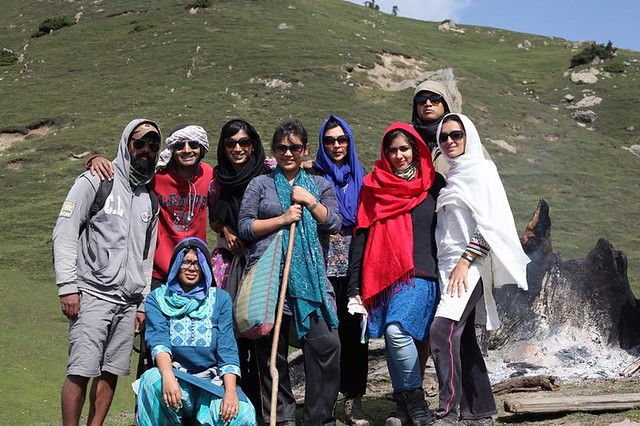
A group of Volunteers from India and abroad on their way to HPS
The Haji Public School is equipped with a computer lab, a library, a playground and many other facilities that are available in any other school in a metropolis. The HPS has expanded its branches further in nearest villages such as Persholla and Shadiwan.
Sharing the teething troubles she faced during initial days of the school, Sabbhah says, “Running a good school in a remote region has its own share of unique problems. The main problem is difficulty in finding teachers. There is paucity of qualified young people in our mountain villages because of earlier pathetic state of education. Also, forget qualified professionals from outside the state, even teachers from Jammu & Kashmir are unwilling to live in this unknown mountain village, a full day away from anywhere,” she points out.

A teacher having her lecture in classroom of HPS
Apart from the few regular teaching staff, the school relies heavily on the volunteers that come from Canada, Singapore, United States, South Africa and France and also those from different parts of India. Sabbah uses her and her family’s personal contacts and also actively promotes her school on social networking sites such as Twitter, Facebook and through blogs/school website to attract not just volunteers but also donations in cash and kind.
“These volunteers contribute much more to students in terms of exposure, methodology, experience and adaptability. Some volunteers even become permanent part of the school management,” she says and cites example of Azon Linhares, Deputy Director, HPS. Linhares is originally from Goa and had joined the school as a volunteer for three months in 2012. He continued his stay since then.
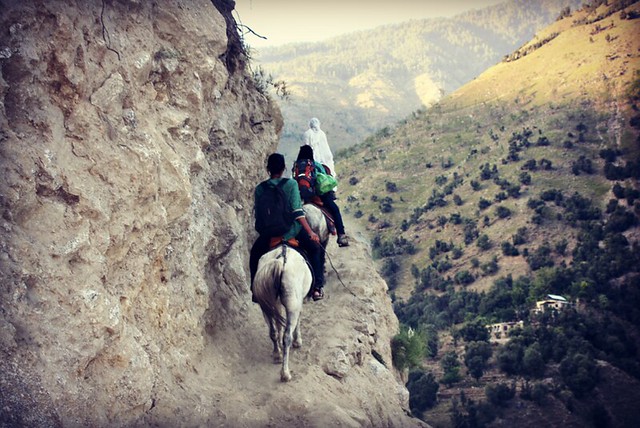
Group of volunteers on their way to HPS through the rough and difficult terrain of Breswana
Personality and confidence of the village children and the community as a whole has risen manifold, directly reflecting the change brought about by the school and its teaching. Kulsuma Banoo, a grade four student of the HPS, says: “I think we are quite lucky in contrast to students of other villages to have such a school in our village.”
“In government schools, teachers are mostly non-available round the year and the quality of education is very poor. As a result, we had to migrate to nearby towns in search of better education for our children’s which sometimes took a toll by rendering us bankrupt. But thanks to Haji family, this school provides quality education in this remotest part,” says Abdul Latief Ahanger, whose two children are studying in grade six and grade seven.
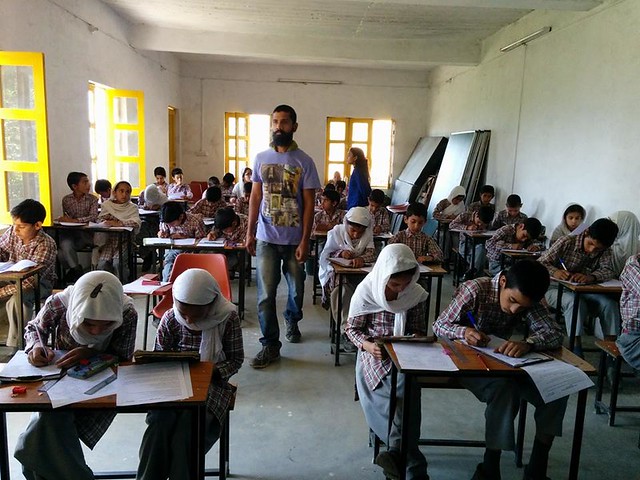
Students appearing in their final examinations
Talking about the positive change the school has brought about in his children’s, Latief says: “I always see them obsessed with books. Also, they were very shy in initial days but now, their level of confidence has increased manifold.”
The Hajis’ long term plan, as per an optimistic announcement on their website, is to grow up to a high school level within the village, by which time, the family intends to set up a college in the vicinity for these students and others in the region to pursue higher education.
Haji Public School is making a redeeming difference. The entire community is now hopeful that their children will finally get an opportunity to make it on their own when they grow up, that they will have the tools required to secure good jobs, earn a living, improve the quality of their lives and, more important, give it back to the community to which they belong.
Sabbah Haji can be followed on Twitter: @imsabbah
The school website: http://www.hajipublicschool.org/
(Photo credit: Haji Public School)
Related:

